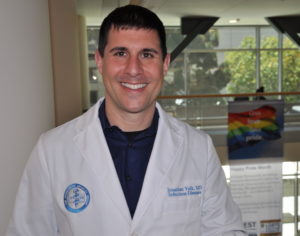Study finds less syphilis, chlamydia, and gonorrhea in Kaiser Permanente Northern California patients who used doxycycline
Taking the antibiotic doxycycline after sexual exposures for prevention of sexually transmitted infections (STIs) — a method known as doxyPEP — was effective in reducing cases of syphilis, chlamydia and gonorrhea in patients at risk for STIs, according to a new study of Kaiser Permanente patients.
The analysis, published in JAMA Internal Medicine, looked at a program offering doxyPEP to patients of Kaiser Permanente Northern California (KPNC) who also receive HIV preexposure prophylaxis (PrEP) medication to prevent acquisition of HIV. DoxyPEP involves taking doxycycline within 72 hours after sexual exposures to reduce risk of acquiring bacterial STIs such as chlamydia, syphilis, and gonorrhea.

There was strong interest among the approximately 12,000 KPNC patients using PrEP; almost 1 in 5, or 2,253 people, filled prescriptions for doxyPEP in its first year of availability starting in November 2022. Most were gay and bisexual men and transgender women.
The study compared bacterial STI infections in the patients before they received a doxyPEP prescription and after. The researchers found incidence declined 79% for chlamydia, 80% for syphilis, and 12% for gonorrhea.
“Our patients have enthusiastically embraced this proactive approach to reduce their STI risk,” said study co-author Jonathan Volk, MD, MPH, an infectious diseases physician with The Permanente Medical Group. “After doxyPEP became available for our PrEP patients, we have seen a dramatic decline in positive STI tests and less need for treatment after STI exposures.”
Volk said the results for reduction in gonorrhea were less than seen in the initial clinical trials for doxyPEP, and the reasons were not immediately clear but may reflect changes in antibiotic resistance.
“These modest reductions in gonorrhea rates reinforce the importance of regular STI testing for patients on doxyPEP and the need for novel prevention strategies for gonorrhea prevention, like vaccines that are currently in development,” he said.
“Our system is the ideal setting to evaluate this new STI prevention method given our large population, availability of data, and most importantly, the willingness of our patients and providers to quickly adopt promising preventive interventions,” said co-author Michael Silverberg, PhD, MPH, an HIV epidemiologist with the Kaiser Permanente Division of Research.

Since being introduced in late 2022, doxyPEP has become the standard of care for KPNC patients on PrEP or with an HIV diagnosis at risk for bacterial STIs, Volk said. “The rise in STIs has been an ongoing challenge,” he said, noting the rising number of syphilis cases in recent decades. “Having more tools at our disposal to reduce incidence is critical.”
DoxyPEP is mostly limited to use in people assigned male at birth, with no efficacy seen in a randomized clinical trial of young women in Kenya. There is ongoing research to develop STI preventive methods for women.
The study’s lead author was Michael Traeger, PhD, a research fellow at Harvard Pilgrim Health Care Institute, and senior author was Julia Marcus, PhD, associate professor of population medicine at Harvard Pilgrim. Other co-authors were Wendy A. Leyden, MPH, of the Kaiser Permanente Division of Research; Michael A. Horberg, MD, of the Mid-Atlantic Permanente Medical Group; Teaniese L. Davis, PhD, of Kaiser Permanente Georgia; Kenneth H. Mayer, MD, Douglas S. Krakower, MD, Jessica G. Young, PhD, of Harvard Medical School; and Samuel M. Jenness, PhD, of Emory University.
For more information, see the Harvard Pilgrim Health Care Institute’s news release.
# # #
About the Kaiser Permanente Division of Research
The Kaiser Permanente Division of Research conducts, publishes and disseminates epidemiologic and health services research to improve the health and medical care of Kaiser Permanente members and society at large. It seeks to understand the determinants of illness and well-being, and to improve the quality and cost-effectiveness of health care. Currently, DOR’s 600-plus staff is working on more than 450 epidemiological and health services research projects. For more information, visit divisionofresearch.kaiserpermanente.org or follow us @KPDOR.





Comments (0)